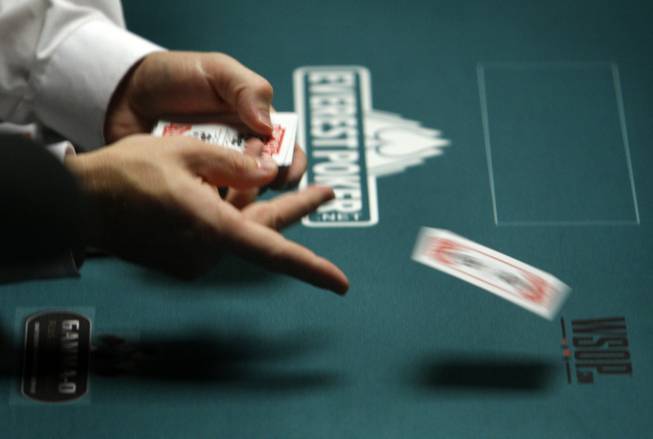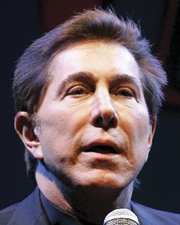
Despite a ruling that Steve Wynn’s tip-pooling policy doesn’t violate state law, dealers insist it’s bad for the industry.
Sunday, July 18, 2010 | 2 a.m.
Reader poll
Sun archives
- Official: Casinos can split dealers’ tips with supervisors (7-12-2010)
- Caesars Palace mulling change on dealer tips (6-14-2010)
- Casino dealers stymied in reaching labor agreement (2-13-2010)
- Caesars Palace plays hardball with dealers, asserts right to tips (1-18-2010)
- Caesars Palace dealers protest on Strip (9-17-2009)
- For Wynn dealers, deal slow to come (6-24-2008)
- Dealers sour on Caesars (11-19-2007)
- Under the radar, Caesars dealers push for union (10-11-2007)
In the fight to reverse Steve Wynn’s policy of sharing casino dealers’ tips with their immediate supervisors, one argument seemed to hold the most promise.
The attorney representing dealers, Jay Litman, didn’t spend too much time parsing Nevada labor law concerning tips, which for decades has been interpreted by state courts in favor of employers. Instead, he focused on the longstanding industry policy that prevents supervisors from receiving tips to avoid potential conflicts of interest.
Supervisors who receive tips from players could compromise the integrity of the games they oversee, potentially bending the rules for a player’s benefit, Litman argued last year before the Nevada Labor Commissioner. It’s not only a bad policy for Wynn, he said; it’s bad for the casino industry, which depends on the public’s confidence.
To bolster his point, Litman presented testimony from a former Wynn Las Vegas dealer who said he witnessed that very problem in his former job as a dealer on cruise ship.
The dealer said he saw a colleague fail to pick up a losing craps bet from the table, instead letting it ride until the bet, placed by the gambler for the dealer, won. The supervisor overseeing the game let it happen as he was receiving a share of the tip pool, thus personally benefiting from the winning bet, the dealer said.
Indeed, theft and fraud are major concerns in Nevada casinos and beyond, which is why many casinos prohibit dealers’ immediate supervisors from accepting gifts worth more than $100.
And yet, this argument failed before the labor commissioner, who ruled last week that the tip-pooling policy at Wynn Las Vegas and Encore is legal. (Dealers said they will appeal to state court.)
The argument didn’t fail on its merits, however. It was simply ignored — as the labor commissioner doesn’t enforce rules governing how table games or casinos are operated.
The appropriate arbiter of gambling integrity, the Gaming Control Board, hasn’t found reason to oppose the tipping policy, either.
Notified in writing last year about conflict-of-interest concerns at Wynn, regulators alerted their auditing staff to potential fraud or theft related to the tip procedure, Control Board Chairman Dennis Neilander says.
The Control Board’s Audit Department says it conducts in-depth checks of gambling control procedures at individual casinos at least once every 2 1/2 years, including how table games are supervised and whether certain game functions such as refilling chips and issuing credit to gamblers are handled correctly. Limited audits occur more frequently, Neilander says.
The Control Board audits found no evidence to support the dealers’ claim, and major casinos generally adopt procedural controls that are over and above the minimum standards required, Neilander says.
“If there were concerns, we would have heard about them,” he adds.
Wynn executives testified to ample controls, including increasingly sophisticated surveillance mechanisms, to protect against any funny business. Other employees besides immediate supervisors are watching the games, they said.
In any case, Neilander argues the board is not the appropriate venue for the dispute, as there is no specific gaming law or regulation that prevents supervisors from receiving tips.
Both groups are failing to address the legitimacy of these real and reasonable concerns, dealers say.
But at least one expert without a dog in the fight disagrees. Jeff Voyles, a casino management professor at UNLV who was a casino dealer and a floor supervisor, says there’s no reason for alarm.
A supervisor included in the tip pool isn’t receiving a direct enough benefit to risk his job by defrauding the casino — especially since any single tip is pooled and split among several hundred workers, Voyles says.
That’s different from the potential for fraud or favoritism if a supervisor receives a direct tip, or bribe, from a player or an employee.
Employee theft and fraud have always been concerns in Nevada casinos. They are constantly on the lookout for players who may be in league with employees to steal from the casino, Voyles adds.
Voyles didn’t like the way Wynn dropped the policy on dealers after they had been working there — and not pooling tips — for more than a year. But Voyles agrees with the stated premise behind the policy, which is to remake floor supervisors — now called “casino service team leads” at Wynn and Encore — into approachable customer service reps.
Rather than happily chatting up customers in the hope that they will return, Las Vegas is rife with grumpy or off-putting suits caught up in the banal technicalities of their jobs, Voyles says.
“I would completely retrain that position so that most of the job would be customer-service oriented rather than game protection,” he says.
Surveillance departments — the “eye in the sky” — should take on most of the burden for catching cheats, as many floor people know the basics of watching for mistakes but lack formal training in the subtle ways of thieves, Voyles argues.
If the floor people are doing their jobs as expected by making the customer feel welcome and pampered, he adds, then they should rightfully receive a portion of the tips players lay on the table, much like the waitress who tips out the busboy and the bartender on her shift.
Litman, who will likely be pressing his point in state court, says that’s a feeble explanation given that Nevada laws call for a strict separation of duties between dealers and supervisors to avoid collusion. It’s only a theory that service would improve because of supervisors receiving a share of tips. The tip might have more to do with prompt cocktail service from a waitress than anything a supervisor did at the game. Nor would Wynn executives explain how a supervisors-only tip pool would not be a superior way to accomplish such customer service goals, Litman notes.
Whether Wynn is delivering on his promise of better service for table games players is up for dispute, especially among unhappy dealers receiving lighter paychecks.
And yet, he has jumped the biggest hurdle of all by avoiding regulatory criticism for a policy that has turned a casino custom on its head.


Join the Discussion:
Check this out for a full explanation of our conversion to the LiveFyre commenting system and instructions on how to sign up for an account.
Full comments policy